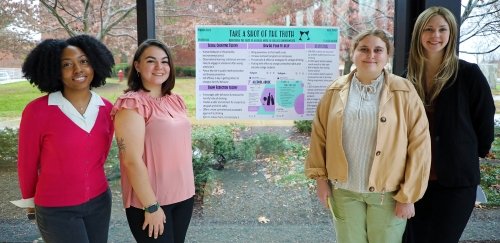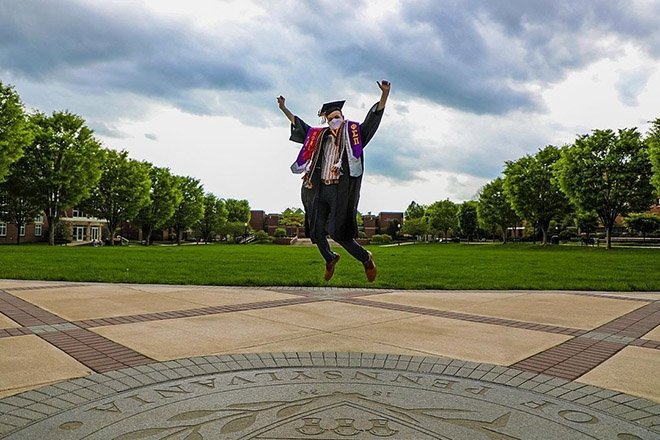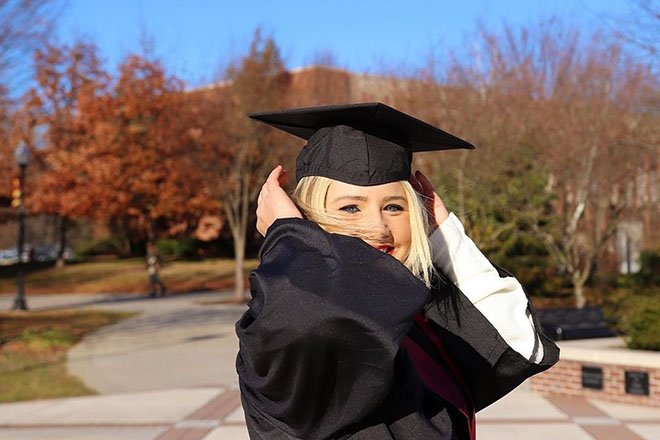Commstud.102 Introduction to Communication Studies (3) - Introduces students to the field of communication studies by examining applied research findings across major contexts. Students will learn about seminal and important works in each context. Completion of the course will yield a broad overview of communication studies and a basic understanding of prototypical studies across the discipline. This large lecture course is open to non-majors who have earned less than 45 credits and is offered at least once a year. This course earns three GEPs toward Goal 6 Social Sciences in general education. Three hours lecture per week. Prerequisites: None.
Commstud.103 Public Speaking (3) - Introduces students to the verbal, nonverbal, and organizational skills necessary for giving effective public presentations. Students will learn the theory and principles of effective public speaking and practice these principles by performing and analyzing speeches. Students will complete at least three major speaking assignments. This course is open to all students and is offered every Fall and Spring. This course earns three GEPs toward Goal 1 Communication in general education. Prerequisites: None. Three hours lecture per week.
Commstud.104 Interpersonal Communication (3) - Introduces students to the process of interpersonal communication. Students will explore the role of conversations and relationships to enhance their participation in daily interactions and their critical awareness of the process. This skills-based course typically includes lecture, discussion, and in-class activities. The course is open to all students and is offered every Fall and Spring. May be offered in traditional and distance education formats. This course earns three GEPs toward Goal 1 Communication in general education. Three hours lecture per week. Prerequisite: None.
Commstud.106 Small Group Communication (3) - Examines communication principles and practices of successfully leading and participating in small groups. Particular emphasis is placed on communication skills involved in navigating group relationships and group decision making processes. This course is open to all students and is offered at least once each academic year. This course earns one GEP toward Goal 1 Communication, one GEP toward Goal 3 Analytical and Quantitative Skills and one GEP toward Goal 10 Citizenship in general education. Prerequisite: None. Three hours lecture per week.
Commstud.150 Impromptu Speaking (1) - Introduces the methods and concepts of impromptu speaking, which is speaking with little or no preparation. Students will gain practical experience in impromptu speaking by completing a variety of speaking assignments.
Commstud.151 Strategies for Stress Management and Coping (1) - Introduces students to a nuanced understanding of stress and the various ways of managing and coping to learn the various facets of "stress" such as the various definitions of stress, the different categories of stressors, and the common contexts in which college aged students experience stress. Additionally, students will learn various coping strategies for stress management, with special emphasis placed on coping strategies involving communication with others.
Commstud.152 Contemporary Romantic Relationships (1) - Explores theoretical and practical aspects of how contemporary romantic relationships develop, are maintained, and deteriorate, and the role communication plays throughout each stage. Students will examine specific communication issues such as online/cell phone application dating, various unique relationships such as "just talking" and "friends with benefits", long distance relationships, and relationship maintenance strategies. This course starts mid-semester and may be offered fall, spring, summer, and winter semesters.
Commstud.205 Understanding Social Influence (3) - Provides students with an historical overview of an intellectual tradition whose theories enhance understanding of how to induce cooperation among others, shape social values, and sway decision making. Armed with this knowledge, students will be better prepared to advocate and lead in public affairs. This course counts as a Group A, Humanities and The Arts General Education Requirements. Three hours lecture per week. Prerequisites: Completion of Commstud.103 Public Speaking or Commstud.104 Interpersonal Communication or by permission of instructor.
Commstud.207 Communication Research Methods (3) - Introduces students to the empirical research process in the field of Communication Studies. Students will learn the basics of empirical research including the planning of studies, quantitative designs, qualitative designs, nonparametric/parametric data analysis, interpretation of results, and scientific measurement of variables. This writing intensive course also introduces students to the process involved in conducting background research and reporting on empirical research. This course will be offered at least once per year. Three hours lecture per week. Prerequisites: COMMSTUD.103 or COMMSTUD.104 or permission of instructor.
Commstud.209 Examining Communication (3) - Introduces students to the art of communication analysis and to a variety of critical approaches which help students negotiate their way through a world of messages that compete for attention, influence beliefs and decisions, affect social change, and craft cultural identities. This course counts as a Group A, Humanities and The Arts General Education Requirements. Communication Studies majors/minors only and completion of either COMMSTUD.103 Public Speaking or COMMSTUD.104 Interpersonal Communication or by permission of instructor. Three hours lecture per week.
Commstud.210 Organizational Communication Theory (3) - Explores theoretical and practical aspects of how communication patterns develop in organizations, and what effect these patterns have on various organizational processes and outcomes. Students will examine specific communication issues relevant in all types of organizations as well as discussing contemporary issues which organizations face. This course will be offered fall and spring semesters. Three hours lecture per week. Prerequisites: Students must have completed COMMSTUD.104 or by permission of instructor Majors and Minors only.
Commstud.215 Communication Theory (3) - Surveys theories of communication studies, both general theories and those specific to particular contexts such as intrapersonal, interpersonal, small group, intercultural, and public communication. A wide range of readings reflects the multi-disciplinary nature of contemporary communication studies. This course will be offered at least once per year. Three hours lecture per week. Prerequisites: Students must have completed COMMSTUD.104 or by permission of instructor Majors and Minors only.
Commstud.220 Intercultural Communication (3) - Explores communication in cultural contexts. Students will be exposed to general principles for communication across cultures, both international and domestic, with the goal of becoming competent communicators. In addition to dealing with "international" contacts such as exchange programs and orientation to travel abroad, and/or study abroad, the course will explore "co-cultural" variations--that is, similarities and differences of individuals within the United States, and cultural differences and similarities transnationally in race, gender, sexual orientation, age, and condition of disability. This course is open to all students and is offered at least once per year. May be offered in traditional and distance education formats. This course earns one GEP toward Goal 1 Communication and two GEPs toward Goal 4 Cultures and Diversity in general education. Prerequisite: None. Three hours lecture per week.
Commstud.306 Computer Applications for Professional Communicators (3) - Familiarizes students with a variety of computer programs used in the field of communication. Students will learn the theory and procedures of desktop publishing, multimedia presentations, and website design. Three hours lecture per week. Prerequisites: COMMSTUD.103 Public Speaking, or permission of instructor.
Commstud.307 Communication for Business Professionals (3) - Designed to survey and strengthen necessary written and oral communication skills for entry-level managers, employees, and communication professionals in business and professional settings. It emphasizes important skills from three basic communication areas: interpersonal and organizational, interviewing and group, and public. Three hours lecture per week. Prerequisites: COMMSTUD.104 Interpersonal Communication, or by permission of instructor.
Commstud.309 Gender Issues in Communication (3) - Presents a broad range of theories concerning the nature of differences in communication behavior between the sexes and the presumed origins of such differences. It also examines communication theories about relationships between the sexes in families and other intimate associations, in business roles, and in society at large. The primary focus is on contemporary U.S. society, but some historical and cross-cultural contrasts will also be explored. This course is open to Communication Studies majors/minors, Gender Studies minors, and others by permission of instructor. Course is offered at least once a year. This course earns one GEP toward Goal 1 Communication and two GEPs toward Goal 4 Cultures and Diversity in general education. Prerequisite: COMMSTUD.104: Interpersonal Communication; or by permission of instructor. Three hours lecture per week.
Commstud.313 Conflict Management and Resolution (3) - Analyzes the role of communication in the generation, process, and management of destructive and constructive conflict on interpersonal, small group, organizational, and societal levels. Three hours lecture per week. May be offered in traditional and distance education formats. Prerequisites: COMMSTUD.104 or by permission of instructor.
Commstud.314 Communicating Identity and Difference (3) - Focuses on the role of communication in the construction of cultural identities. The course addresses processes by which individual identities are formed, maintained, and executed during interpersonal interactions. Class content explores communicative factors that impact identity development, maintenance, and negotiation as a means to make sense of social, cultural, and interpersonal structures of relating within the United States. Primary goals of the course include understanding the social construction of difference as well as social justice strategies for bridging the gap in identity differences to improve interpersonal functioning. The course is open to Communication Studies majors/minors, Ethnic Studies minors, and others by permission of instructor. Course is offered at least once a year. Prerequisite: COMMSTUD.104 - Interpersonal Communication
Commstud.315 Persuasion (3) - Examines the way people use symbols to influence other people. It provides practice in crafting, presenting and evaluating persuasive messages. Three hours lecture per week. Prerequisites: COMMSTUD.103 Public Speaking or by permission of instructor.
Commstud.316 Communication Ethics (3) - Raises consciousness, suggests possible criteria for judgment, and stimulates critical thinking about ethical problems in communication within interpersonal, organizational, mediated and public/political realms.
Commstud.321 Argument and Analysis (3) - Focuses on the techniques of reason-giving in communicative situations, analyzing controversial issues, the validity of claims and evidence, the detection of fallacies, and the ability to effectively communicate a point of view and refute the contentions of others. Three hours lecture per week. Prerequisites: COMMSTUD.103 Public Speaking or by permission of instructor.
Commstud.324 Health Communication (3) - Examines the development of the health communication as a discipline and communication in medicine and health care delivery systems. The course further investigates communication and language barriers, narratives of ill health among cultures, global health communication and marginalized communities, social support networks, and health campaign messages. In addition, the course surveys research trends and future directions of health communication within health care environments. Three hours lecture per week. Prerequisites: COMMSTUD.104 Interpersonal Communication or by permission of instructor.
Commstud.407 Interviewing (3) - Allows students to explore the interview as a specific communication event, with its own rules, procedures and strategies. It acquaints students with a variety of interview contexts, such as selection, performance appraisal, informational, helping, sales, and health care, by blending current theory and research with practical skills and applications. In this applied course students will prepare and conduct interviews, and receive feedback on their oral and written performances. This course counts as a Group A, Humanities and The Arts General Education Requirements. Three hours lecture per week. Prerequisites: Completion of either COMMSTUD.205 Understanding Social Influence or COMMSTUD 210 Organizational Communication Theory or COMMSTUD.215 Communication Theory, and completion of all core courses (COMMSTUD.103, COMMSTUD.104, COMMSTUD 106, COMMSTUD.207, COMMSTUD.209, COMMSTUD.220), or by permission of instructor. Students must have earned a minimum grade of C in COMMSTUD.207 and COMMSTUD.209.
Commstud.413 Community Leadership (3) - Identifies the communication skills that leaders need to help influence the information environment and the collective action of community members. We will adopt a rhetorical perspective in examining leadership within the contexts of political communication and social movement rhetoric. This course counts as a Group A, Humanities and The Arts General Education Requirements. Three hours lecture per week. Prerequisites: Completion of either COMMSTUD.205 Understanding Social Influence or COMMSTUD.215 Communication Theory, and completion of all core courses (COMMSTUD.103, COMMSTUD.104, COMMSTUD.207, COMMSTUD.209, COMMSTUD.220), or by permission of instructor. Students must have earned a minimum grade of C in COMMSTUD.207 and COMMSTUD.209.
Commstud.417 New Media and Visual Culture (3) - Evaluates communication in a variety of mediated contexts by learning theoretical concepts from media studies, visual rhetorical theory, and critical cultural studies and applying them to real-world examples. This course will be offered at least once per year. Prerequisites: Completion of COMMSTUD 205 - Understanding Social Influence, or COMMSTUD 210 - Organizational Communication Theory, or COMMSTUD 215 - Communication Theory and completion of all core courses (COMMSTUD 103, 104, 106, 207, 209 and 220) or by permission of instructor. Majors must earn a minimum grade of C in COMMSTUD 207 and COMMSTUD 209 to take 400 level courses.
Commstud.418 Issue and Image Campaigns (3) - Encompasses the role of campaigns in shaping social, cultural, and political agendas; theoretical foundations of persuasive campaigns; and effective strategies for creating, maintaining, and restoring image as a fitting response to emergent issues. Students participate in the planning of an actual issue and image campaign proposal to gain experience as persuasive strategists. This course counts as a Group A, Humanities and The Arts General Education Requirements. Three hours lecture per week. Prerequisites: Completion of either COMMSTUD.205 Understanding Social Influence or COMMSTUD 210 Organizational Communication Theory or COMMSTUD.215 Communication Theory, and completion of all core courses (COMMSTUD.103, COMMSTUD.104, COMMSTUD 106, COMMSTUD.207, COMMSTUD.209, COMMSTUD.220), or by permission of instructor. Students must have earned a minimum grade of C in COMMSTUD.207 and COMMSTUD.209.
Commstud.419 Family Communication (3) - Focuses on the interaction patterns and communication dynamics that define families and shape family functioning. Students will learn about the theories and methods used in and applications of contemporary family research. This course counts as a Group A, Humanities and The Arts General Education Requirements. Three hours lecture per week. Prerequisites: Completion of either COMMSTUD.205 Understanding Social Influence or COMMSTUD 210 Organizational Communication Theory or COMMSTUD.215 Communication Theory, and completion of all core courses (COMMSTUD.103, COMMSTUD.104, COMMSTUD 106, COMMSTUD.207, COMMSTUD.209, COMMSTUD.220), or by permission of instructor. Students must have earned a minimum grade of C in COMMSTUD.207 and COMMSTUD.209.
Commstud.420 Nonverbal Communication (3) - Provides an overview of the forms and functions of nonverbal communication including: distinctions between nonverbal and verbal communication, codes of nonverbal communication, the communication of emotions, sex and nonverbal communication, nonverbal immediacy, nonverbal communication in power and persuasion, and the role of nonverbal communication in deception. This course counts as a Group A, Humanities and The Arts General Education Requirements. Prerequisites: Completion of either COMMSTUD.205 Understanding Social Influence or COMMSTUD 210 Organizational Communication Theory or COMMSTUD.215 Communication Theory, and completion of all core courses (COMMSTUD.103, COMMSTUD.104, COMMSTUD 106, COMMSTUD.207, COMMSTUD.209, COMMSTUD.220), or by permission of instructor. Students must have earned a minimum grade of C in COMMSTUD.207 and COMMSTUD.209. Three hours lecture per week.
Commstud.421 Crisis Communication (3) - Explores communication practices associated with preventing and managing organizational crises, and post-crisis organizational learning. Through close consideration of crisis communication research and case studies, this course will help students define the causes of organizational crises stemming from communication in face-to-face, Internet, social media and other environments. The course examines and applies theories of crisis communication and explores ways to manage organizational crises and ways to prevent them through proven communication practices. Enrollment Requirement: COMMSTUD 205-Under Soc. Infl.or COMMSTUD 210-Org. Comm.Thry or COMMSTUD 215-Comm.Thry, and completion of all core courses (COMMSTUD 103, 104,106, 207, 209 & 220),or by permission of instructor. Majors must earn a C in COMMSTUD 207 & 209 to take 400 level courses.
Commstud.423 Communication Training in Organizations (3) - Focuses on advanced presentation skills for students exploring career opportunities as communication trainers or as professionals engaged in, or facilitating, adult learning. This class provides an overview of the training process including topics such as: needs assessment and task analysis, theories of adult learning, curriculum and content development, persuasion and personal selling, preparation/ presentation of workshop sessions, and the evaluation of outcomes. This course counts as a Group A, Humanities and The Arts General Education Requirements. Three hours lecture per week. Prerequisites: Completion of either COMMSTUD.205 Understanding Social Influence or COMMSTUD 210 Organizational Communication Theory or COMMSTUD.215 Communication Theory, and completion of all core courses (COMMSTUD.103, COMMSTUD.104, COMMSTUD 106, COMMSTUD.207, COMMSTUD.209, COMMSTUD.220), or by permission of instructor. Students must have earned a minimum grade of C in COMMSTUD.207 and COMMSTUD.209.
Commstud.425 Relational Communication (3) - Provides an in-depth analysis of theory and research relevant to close personal relationships. Students will explore contemporary research on issues germane to developing and escalating relationships, maintaining fair and satisfying relationships, and coping with relationship challenges. Three hours lecture per week. Prerequisites: Completion of either COMMSTUD.205 Understanding Social Influence or COMMSTUD 210 Organizational Communication Theory or COMMSTUD.215 Communication Theory, and completion of all core courses (COMMSTUD.103, COMMSTUD.104, COMMSTUD 106, COMMSTUD.207, COMMSTUD.209, COMMSTUD.220), or by permission of instructor. Students must have earned a minimum grade of C in COMMSTUD.207 and COMMSTUD.209.
Commstud.426 Leadership and Team Building (3) - Provides an intensive survey of theory and research pertaining to working in small task groups. The course includes a focus on practical knowledge required to become a productive participant and leader in small group contexts. Three hours lecture per week. Prerequisites: Completion of either COMMSTUD.205 Understanding Social Influence or COMMSTUD 210 Organizational Communication Theory or COMMSTUD.215 Communication Theory, and completion of all core courses (COMMSTUD.103, COMMSTUD.104, COMMSTUD 106, COMMSTUD.207, COMMSTUD.209, COMMSTUD.220), or by permission of instructor. Students must have earned a minimum grade of C in COMMSTUD.207 and COMMSTUD.209.
Commstud.427 Strategic Communication (3) - Invites students to explore the forms and practices of strategic communication and their influence on contemporary global society. Course participants will learn to plan, develop, and manage effective strategic communication plans for corporations, NGOs, or government agencies. Three hours lecture per week. Prerequisites: Completion of either COMMSTUD.205 Understanding Social Influence or COMMSTUD 210 Organizational Communication Theory or COMMSTUD.215 Communication Theory, and completion of all core courses (COMMSTUD.103, COMMSTUD.104, COMMSTUD 106, COMMSTUD.207, COMMSTUD.209, COMMSTUD.220), or by permission of instructor. Students must have earned a minimum grade of C in COMMSTUD.207 and COMMSTUD.209.
Commstud.429 Event Planning (3) -Explores the role of communication in setting the stage for successful events. Event Planning provides an introduction to the research, planning, promotion, implementation, and evaluation that is encompasses in hosting a variety of special events such as corporate branded events, non-profit fundraisers, association conferences, society events such as community festivals, political campaigns, activist rallies and cradle-to-grave social events. Enrollment Requirement: COMMSTUD 205-Under Soc. Infl.or COMMSTUD 210-Org. Comm.Thry or COMMSTUD 215-Comm.Thry, and completion of all core courses (COMMSTUD 103, 104,106, 207, 209 & 220),or by permission of instructor. Majors must earn a C in COMMSTUD 207 & 209 to take 400 level courses.
Commstud.470 Independent Study (1-3) - Provides for individual work and study in one of the areas of rhetoric and communication. Student finds a faculty sponsor, prepares a written proposal that requires departmental recommendation and the dean's approval, arranged through the chairperson. See section on Independent Study. Prerequisites: Completion of either COMMSTUD.205 or COMMSTUD.215, and completion of all core courses (COMMSTUD.103, COMMSTUD.104, COMMSTUD 106, COMMSTUD.207, COMMSTUD.209, COMMSTUD 210, COMMSTUD.220), or by permission of instructor. Students must have earned a minimum grade of C in COMMSTUD.207 and COMMSTUD.209.
Commstud.492 Special Topics in Organizational Communication (3) - This course is designed to explore a particular area of emphasis in the Organizational Communication area of Communication Studies. The area specified will be determined by the professor of record. Offered as prudent. May be offered in traditional and distance education formats. Three hours lecture per week. Prerequisites: Completion of either COMMSTUD.205 Understanding Social Influence or COMMSTUD 210 Organizational Communication Theory or COMMSTUD.215 Communication Theory, and completion of all core courses (COMMSTUD.103, COMMSTUD.104, COMMSTUD 106, COMMSTUD.207, COMMSTUD.209, COMMSTUD.220), or by permission of instructor. Students must have earned a minimum grade of C in COMMSTUD.207 and COMMSTUD.209.
Commstud.493 Special Topics in Interpersonal Communication (3) - Explores a particular area of emphasis in the Interpersonal Communication track of Communication Studies. The topic area specified will be determined by the professor of record. Three hours lecture per week May be offered in traditional and distance education formats. Prerequisites: Completion of either COMMSTUD.205 or COMMSTUD.215, and completion of all core courses (COMMSTUD.103, COMMSTUD.104, COMMSTUD 106, COMMSTUD.207, COMMSTUD.209, COMMSTUD 210, COMMSTUD.220), or by permission of instructor. Majors must earn a minimum grade of C in COMMSTUD.207 and COMMSTUD.209 to take 400 level courses.
Commstud.494 Advanced Studies in Communication (3) - Investigates significant aspects of communications studies. Topics are approved as diversity courses. Consult the schedule booklet or the listed instructor for further information. This course is approved as a Diversity General Education Course/This course counts as a Group A, Humanities and The Arts General Education Requirements. Three hours lecture per week. Prerequisites: COMMSTUD.103 or COMMSTUD.104; at least one of COMMSTUD.205, COMMSTUD.210, COMMSTUD.215 or permission of the instructor.
Commstud.495 Special Topics in Leadership and Public Advocacy (3) - Explores a particular area of emphasis in the Leadership and Public Advocacy Area of Communication Studies. The topic area specified will be determined by the professor of record. Offered as needed. May be offered in traditional and distance education formats. Three hours lecture per week Prerequisites: Completion of either COMMSTUD.205 Understanding Social Influence or COMMSTUD 210 Organizational Communication Theory or COMMSTUD.215 Communication Theory, and completion of all core courses (COMMSTUD.103, COMMSTUD.104, COMMSTUD 106, COMMSTUD.207, COMMSTUD.209, COMMSTUD.220), or by permission of instructor. Students must have earned a minimum grade of C in COMMSTUD.207 and COMMSTUD.209.
Commstud.497 Internship in Communication (3-9) - Integrates classroom experience with practical work experience in industrial, business or government work settings. Students must establish academic integrity of their proposed experience and its relevance to coursework in the major. Contact departmental internship coordinator to obtain detailed information and forms.





















